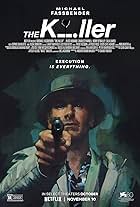A sleeper, as these things go, now waking us all up. Made in 2009 and released in 2010 to a desultory response, the film then began to gather awards including a Czech Lion for best film in 2011. It toured the USA in 2012 and is one of a handful of new Czech films touring art-house cinemas in the UK at present (April 2013).
No need to describe the plot – suffice it to say that it concerns a Statni Bezpecnost officer (i.e. secret policeman) in Czechoslovakia after 1980 (a Solidarity poster gives a terminus post quem) and before the Velvet Revolution of 1989. The film information and blogs refer to the fact that it is set in 1982, but there was nothing in the English sub-titles that I spotted to confirm this. This is a dark past which Czechs and Slovaks need to face up to; as did Lumet's Pawnbroker for a public understanding of the Nazi Death Camps when it came out in 1964, this film will mark an important Czech milestone in this process. The secret policeman is the magnet for the film. His victim,Tomas Sikora, is a shadow, although nuances of the portrayal may have escaped me.
Unfortunately, in the modern manner, it is 146 minutes long. It begins tautly, but in the last 20 to 30 minutes this tautness is abandoned. Several commentators refer, correctly, to its noir elements but one noir element they ignore is the tightness that a 90-minute feature can create: beginning, middle and end.
The digital camera work and choice of locations produces a highly convincing drabness, but for some reason – perhaps the continued sway of neo-realist precepts – it eschews close-ups of hands and objects, although it does close in on facial expressions effectively. And yet close-ups can be used to create suspense as Hitchcock well knew, and if we are watching a thriller not a historical tract, as we are, then close-ups could have been used to great effect: Antonin's paper bags, his gun, for example. And why not make a fetish out of the handcuffs he carries?
One striking thing is the way it handles disparate groupings of characters: Tomas, Klara and Pavel; Antonin, Martin and the Lieutenant Major; Klara and Darina; Tomas and his family; and so on. Not quite Altman's Nashville but in its own way using a wide range of characters to evoke a whole society and era. No doubt this is what its director, Radim Spacek, would point to in order to justify the film's length.
At the centre of it all is Antonin Tonda, on-screen for much of the film. The way he chooses to corrupt himself, beyond the control of his masters, is a metaphor for the way Soviet Communism corrupted itself. He starts as a risk to all citizens, but he turns himself into a threat to the whole state. When I came out of the cinema, I could see how the system that produced a narrative like Walking Too Fast could also trigger Bela Tarr's The Turin Horse (Hungary 2011), a re-wind of the Book of Genesis back to 'Let there be dark'.















